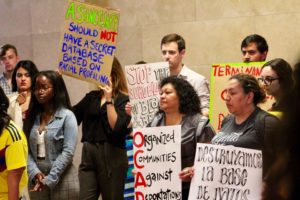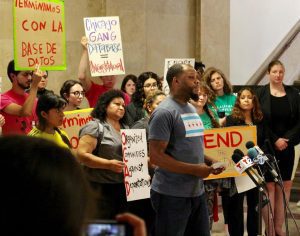Chicagoans for an End to the Gang Database v. City of Chicago
The MacArthur Justice Center represents the Chicagoans for an End to the Gang Database, a coalition of individuals and community organizations, in a federal class action lawsuit against the City of Chicago and Chicago Police Department (CPD) targeting the widespread use of an inaccurate, racially discriminatory Gang Database.
 The lawsuit explains CPD’s unlimited discretion to add names to the Gang Database – there are no consistent guidelines or approval requirements. The CPD disproportionately targets Black and Latinx individuals for inclusion in the Database. Individuals in the Database have no due process protections, including any way to challenge the designation. In addition to using this information to harass and falsely detain people, CPD provides this incorrect, inconsistent Database to third parties, including U.S. Immigrations and Customs (ICE). As a result, the false gang designations can affect an individual’s ability to get employment, licenses, bond, parole, housing, immigration relief, and more.
The lawsuit explains CPD’s unlimited discretion to add names to the Gang Database – there are no consistent guidelines or approval requirements. The CPD disproportionately targets Black and Latinx individuals for inclusion in the Database. Individuals in the Database have no due process protections, including any way to challenge the designation. In addition to using this information to harass and falsely detain people, CPD provides this incorrect, inconsistent Database to third parties, including U.S. Immigrations and Customs (ICE). As a result, the false gang designations can affect an individual’s ability to get employment, licenses, bond, parole, housing, immigration relief, and more.
The coalition is comprised of four individuals, three Black and one Latino, who were each falsely identified as a gang member and has since been subjected to irreparable harm and harassment because of the wrongful designation. They are joined by community-based organizations with deep roots in Chicago’s Black and Latinx communities, including Black Youth Project 100 – Chicago, Blocks Together, Brighton Park Neighborhood Council, Latino Union, Mijente, and Organized Communities Against Deportation (OCAD).
 The lawsuit was resolved in early September 2020. The coalition won significant protections that will reduce the harm to community members, including: stricter criteria for designating individuals as gang members; notice requirements so individuals can find out if they are on the gang database; an appeals process so people can get off the database; user agreements that will forbid other agencies from sharing gang information to third parties for immigration, employment, education, licensing, or housing purposes; transparency around the designation process and appeals process through the publication of aggregate data; and the discontinuation of “gang arrest cards.” After winning these protections, the organizational plaintiffs voluntarily dismissed their claims and the individual plaintiffs settled their claims with the City.
The lawsuit was resolved in early September 2020. The coalition won significant protections that will reduce the harm to community members, including: stricter criteria for designating individuals as gang members; notice requirements so individuals can find out if they are on the gang database; an appeals process so people can get off the database; user agreements that will forbid other agencies from sharing gang information to third parties for immigration, employment, education, licensing, or housing purposes; transparency around the designation process and appeals process through the publication of aggregate data; and the discontinuation of “gang arrest cards.” After winning these protections, the organizational plaintiffs voluntarily dismissed their claims and the individual plaintiffs settled their claims with the City.
I came up in the streets and have worked hard to create a positive life for myself. I never joined a gang and I focused on getting my education. I want to help other young people do the same thing. That’s my calling and my mission in life. But because I’m a young Black man, CPD slapped a gang label on me. Now I can’t get my dream job. I’m filing this lawsuit to clear my name and to help other people whose lives are destroyed because of the lies CPD tells through the gang database.
Latest Developments
-
Plaintiffs Urge the City to Stop the Use of All CPD Gang Databases —
The organizational plaintiffs issued a statement rejecting the new gang database and calling for the City to repair the harm inflicted on Chicagoans by the use of the old gang database.
September 3, 2020 -
Lawsuit Over Chicago’s Controversial Gang Database Comes to an End —
The federal class action lawsuit over the use of the highly inaccurate and racially discriminatory gang database came to a close, and resulted in settlements for the individual plaintiffs, and a voluntary dismissal by the organizational plaintiffs.
September 2, 2020 -
Erase the Gang Database Campaign Wins Award —
The Erase the Database Campaign received an award at the Grassroots Collaborative People’s Gala for their work in shutting down the Cook County Sheriff’s gang database called RGID.
October 11, 2019
In the News
-
Lawsuit Over Gang Database Dismissed as City Officials Agree to Alter Policy
WTTW November 10, 2020 -
Lawsuit alleges Chicago Police Department’s massive gang database discriminatory, inaccurate
Chicago Tribune June 20, 2018 -
Like Chicago Police, Cook County and Illinois Officials Track Thousands of People in Gang Databases
ProPublica July 19, 2018 -
Chicago’s Gang Database Is Full of Errors — And Records We Have Prove It
ProPublica June 19, 2018
For media inquires please contact:
(NOTE: This mailbox is for media inquiries only. All other inquiries, including legal and representation questions, should be submitted through our Contact Form.)
